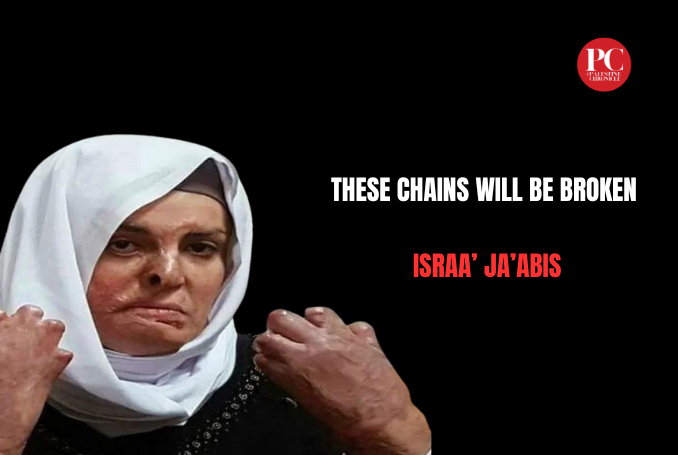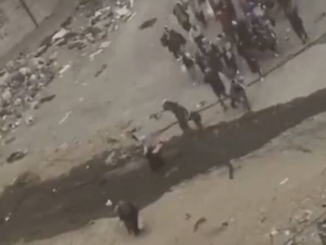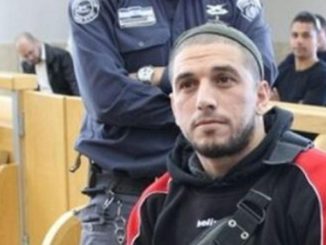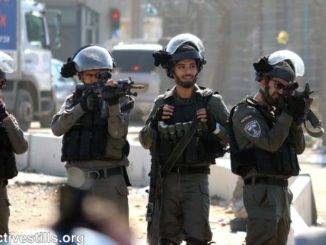
Starting on Friday, November 24, a prisoner swap between the Palestinian resistance and Israel began in stages. On Friday, 39 Palestinian prisoners were released. More prisoners were freed on Saturday. They included Israa’ Ja’abis, whose story was included in Ramzy Baroud’s volume ‘These Chains Will Be Broken: Palestinian Stories of Struggle and Defiance in Israeli Prisons’. (Clarity Press.)
The text below appeared in a chapter entitled “Israa’ Riyad Ja’abis – Narrated by her sister, Mona Ja’abis”.
Israa’ Ja’abis was born on July 22, 1984, in Al-Quds (Jerusalem), the fourth of nine sisters and brothers. She was arrested following an electrical system failure in her car which caught fire while she was still trapped inside. It resulted in first, second and third-degree burns on her face and all over her body, including the loss of eight fingers.
On the day of the accident, October 11, 2015, Israa’ drove from Jericho to Al-Quds in a small car that was overflowing with household items. She was moving to Jerusalem with her son, Mu’tasim, and, by transporting some of the small furniture, she had hoped to save on moving expenses.
Israa’ was moving to Jerusalem without her husband. Her only son, Mu’tasim, was born in Jerusalem and that qualified him for residence in the occupied city. She was allowed to stay with him as she, too, was a Jerusalem resident. His father, however, was barred from the city due to his West Bank ID card. The family agreed to separate for a number of years so that Mu’tasim would have the opportunity for better schooling and health care. Neither parent was thrilled by the decision, but they felt that they had no other option.
One of the items that Israa’ carried with her was a propane tank for the kitchen. It would have been too expensive to buy a brand new one in Jerusalem. As she was leaving Jericho, the engine of her car died twice. Young people in the town warned her to turn around and find another form of transportation, but she did not heed their advice. She needed to get to Jerusalem to her new job at a nursing home. Each time her car died, the engine emitted a burning smell.
After travelling a couple of kilometers outside the Israeli Al-Za’ayem military checkpoint, near the illegal Jewish settlement of Ma’ale Adumim and a short distance east of Al-Quds, Israa’s car died again. No soldiers or army vehicles were in sight. A while later, a retired Israeli police officer passed by her stalled car. He parked his car in front of hers and asked for her ID as she desperately tried to restart the car. “There is a strong smell in the car,” she told him, trying to exit the car, but he insisted that she stay inside while he examined her papers.
She tried to open the windows, but they, too, were affected by the electrical failure. Again, she tried to exit the car, opening the door, but the officer rushed over and slammed it shut, crushing her hand. She yelled “Allahu Akbar ’alaiku” (God is greater than you are), chastising him several times for not allowing her to escape. She urged him to let her out as fire ignited in the front part of the car. He refused. He stood there, watching her burn inside. The airbag deployed, completely trapping her inside the blazing car.
The police officer who stopped her claimed that she was trying to use the propane tank to blow up the car. His testimony was the only one considered in the Israeli court, and Israa’ was branded a ‘terrorist’. She was sentenced to 11 years in prison. She is now serving her term at HaSharon prison inside Israel, and is denied much needed medical attention. After her debilitating injuries and imprisonment, her husband also suffered a car accident, leaving him permanently disabled and confined to a wheelchair. Their son, Mu’tasim, is now living with his grandmother in Jerusalem.
Mona is Israa’s older sister and ‘best friend’.
‘No Pain Like Mine’
It is too difficult to describe the first time we saw Israa’. We learned bits of information here and there about the nature of her wounds, and of the fact that some of her fingers were amputated. I thought that I was mentally prepared to see my sister in that condition, but I was wrong.
I visited her for the first time one week after the accident. I wore the attire of a religious Jewish woman to disguise myself in the hospital. I speak fluent Hebrew, and my dress and language skills allowed me access into the hospital. I made my way to the emergency ward and watched Israa’ through a large glass window. There was a police officer sitting beside her, as if she could possibly move, let alone escape in that condition. I did not recognize her right away. Her face and body were bandaged and bloated. But I then recognized her through her height and her hair. The officer noticed my presence. I told him that I had lost my way, but he ordered me to leave.
I told my parents, who were waiting outside, that I saw her and that she was okay. I could not bring myself to tell them the truth.
Two months later, I returned with my parents. We were only permitted to see her from behind the glass window and were not allowed to talk to her. I will never forget the look on my parents’ faces. Tears gushed from my father’s eyes. He struggled to find words, but could not speak. My mother kept mumbling to herself, as if a mantra: “She is fine; she is fine; medicine will fix everything; she is fine …” Israa’ was not aware of our presence. A group of Israeli officers were surrounding and interrogating her.
I was trying to prepare my nephew, Mu’tasim, for the transformation that had taken place. I told him that his mom had had an accident and that he would be allowed to meet her soon. But he is a smart kid. Although only eight years old at the time, he searched the news and found out what had happened. But he still could not find pictures of her after the accident. I sat with him again and told him: “I love my mother no matter what she looks like, white, black or red; whether her face is blemished or not.” He said: “I love my mom, too, no matter what.” Then I showed him a photo of her that was intentionally distorted. I did not want him to actually see right away how horrific her disfigurement was. He sat in silence for a long time. He seemed emotionally disconnected, as if the story was about someone else.
Israa’ stayed in the hospital for three months. We were not even informed of her medical condition or progress. We would sneak into the hospital like thieves and, when the police discovered us, they would immediately throw us out.
The first time we were officially allowed to meet with her was in HaSharon prison. We were separated by a thick wall of glass. My mother only recognized her from her height, as Israa’ is particularly tall. My mother rested her head in her hands and said nothing; she only wept.
I kept myself from crying, though. I told Israa’: “We love you and we will stand by your side, no matter what the obstacles.” My father seemed to have lost his mind. He hobbled around the room, crying: “Israa’, sweetheart. Israa’, I am your father.” Israa’ kept telling him: “I am Israa’, Daddy. Please look, just look at me. My face is burned, but my heart, my mind and my whole being is still the same.” I kept assuring him that this was Israa’ but he was too confused and kept walking in circles, screaming her name. She was always a source of strength for him. When he finally realized that she was his daughter, he broke down, weeping like a child.
Israa’ was the backbone of our family. When I visited her the second time, I told her: “You don’t always have to be the strong one. It’s okay to be vulnerable sometimes.” As soon as I said that, she began crying, and she cried for a long time.
When Mu’tasim came with us to visit her for the first time, the prison administration did not allow him to enter. So I sat with him in the parking lot, waiting for my parents to come out. When they did, they were holding hands, wailing like little children. I went running towards them. They told me that they had amputated all of her fingers except two. Then we praised Allah for allowing her to keep the two fingers.
A year and two months later, Mu’tasim was finally allowed to see her. He was nine years old then. I took him, as my mother could no longer cope with the pain of seeing her daughter in that condition. But the prison guards did not allow me access to her room. They only allowed Mu’tasim to talk to her from behind the glass barrier. He begged them to let him hug his mother and, finally, they relented, agreeing to allow him to spend ten minutes with her. I watched from behind the glass as Israa’ walked in wearing a Tigger costume. She had sewn it inside the prison, as she knows how much Mu’tasim loves the Winnie the Pooh cartoon. She even designed and wore a Tigger mask. When Israa’ was younger, she loved to dress up in costumes and perform as a clown for various community events for children. Mu’tasim told her: “I know you are my mother. I don’t want Tigger. I want to see your face.” So she removed the mask. Mu’tasim was shocked. His eyes filled quickly with tears. He told her: “I love you, no matter what.” He told her that the “acne on your face will soon go away”. When it was time to leave, he clung to her, refusing to let go. The guards asked me to intervene. Mu’tasim kept repeating: “You either let me stay, or let her come home with me.”
On the way home, Mu’tasim told me, after a long silence: “My mom will always be beautiful, even if the acne never goes away.”
My heart breaks for Israa’, my tall, slender, sister with a beautiful face, the lovely one whose hands were always adorned with henna. In her we saw hope, strength and beauty. The harshness of the occupier scarred her face and body, amputated her fingers and is relentlessly trying to break her spirit. I will never forget when a journalist asked her across the court room, as she sat surrounded by armed Israeli officers: “Are you in pain?” She raised whatever remained of her hands and answered: “No pain is like mine.”
If I could only take even some of my sister’s pain away …









I’m delighted to read that Israa’ Ja’abis has finally been freed and is back with her family.
However, my thoughts and prayers remain with Ahmad Manasra who is suffering beyond belief as he languishes in an Israeli prison. He was a only a child when he was imprisoned and after spending years in solitary confinement and heaven knows what else he’s had to endure, is it any wonder that his physical and mental health has seriously deteriorated.
Each of us must do whatever we can to get him freed. As civilised human beings, we have a moral duty, no matter our nationality or religion.
Excelente